
The Bharatiya Janata Party is a political party in India and one of the two major Indian political parties alongside the Indian National Congress. Since 2014, it has been the ruling political party in India under the incumbent Prime Minister Narendra Modi. The BJP is aligned with right-wing politics and has close ideological and organisational links to the Rashtriya Swayamsevak Sangh (RSS), a far-right paramilitary organisation. Its policies adhere to Hindutva, a Hindu nationalist ideology. As of January 2024, it is the country's biggest political party in terms of representation in the Parliament of India as well as state legislatures.

Mehbooba Mufti Sayed (Urdu: محبوبہ مفتی سید) is an Indian politician and leader of the Jammu and Kashmir People's Democratic Party (PDP), who served as the 9th and last chief minister of the erstwhile state Jammu and Kashmir from 4 April 2016 to 19 June 2018. She was the first female chief minister of Jammu and Kashmir. After the revocation of Article 370 of the constitution in August 2019, Mufti was detained without any charges at first and later under the Jammu and Kashmir Public Safety Act.

Rajyavardhan Singh Rathore is an Indian politician, Olympic medallist in shooting and retired colonel in the Indian Army. He is serving as a cabinet minister at the Industry & Commerce, Youth Affairs & Sports Department in the Government of Rajasthan since December 2023. Rathore was a Member of Parliament in the Lok Sabha from Jaipur Rural seat since 2014 till 2023.

Bhim Singh was an Indian politician, activist, lawyer and author. He was the founder, president and chief patron of the socialist and secular Jammu and Kashmir National Panthers Party (JKNPP). Singh was Panthers Party chairman for 30 years from 1982-2012, chief patron from 2012-2021, and president from 14 February 2021-31 May 2022. In effect with over 40 years of controlling leadership, he was India’s longest serving political party leader, and one of the longest serving leaders in the world.

The Jammu & Kashmir National Panthers Party is a socialist and secular state political party in the state of Jammu and Kashmir, India. The party was founded on 23 March 1982 by husband and wife Prof. Bhim Singh and Jay Mala, Its aim is to "demolish corruption, communalism, criminalization, drug menace" and to establish a real democracy through ultimate revolution. Panthers party has maintained power at assembly and the local level for over four decades in its stronghold within the mountainous Udhampur constituency, where in the vicinity 5.9 million tonnes of Jammu and Kashmir lithium reserves, the 7th largest known reserve in the world, with an estimated value of $500 billion, was discovered in February 2023.
Although India is a parliamentary democracy, the country's politics has become dynastic or with high level of nepotism, possibly due to the absence of party organizations, independent civil-society associations which mobilize support for a party, or centralized financing of elections. The dynastic phenomenon is present at the national, state, regional, and district level. The Nehru–Gandhi family has produced three Indian prime ministers, and family members have largely led the Congress party since 1978. The Bharatiya Janata Party (BJP) also has several dynastic leaders. In addition to the major national parties, other national and regional parties such as Dravida Munnetra Kazhagam (DMK), Shiromani Akali Dal, Shiv Sena, Samajwadi Party, Rashtriya Janata Dal, Janata Dal Secular, Jharkhand Mukti Morcha, Kerala Congress, Jammu & Kashmir National Conference, Indian Union Muslim League, AIMIM, and the Nationalist Congress Party are all dominated by families, mostly those of the party founders.

Chaudhary Lal Singh is an Indian politician from Jammu and Kashmir. He was Minister for Forest, Environment, Ecology of J&K in PDP-BJP coalition government in J&K. He represented the Basohli in Jammu and Kashmir Legislative Assembly.

Karan Singh is an Indian politician and philosopher. He is the titular Maharaja of the princely state of Jammu and Kashmir. From 1952 to 1965 he was the Sadr-i-Riyasat (President) of the state of Jammu and Kashmir. He is the chairperson trustee of the Dharmarth Trust of Jammu and Kashmir which maintains 175 temples in north India and works in other areas such as historical preservation.
Chaman Lal Gupta was an Indian politician from Jammu and Kashmir, belonging to Bharatiya Janata Party. He was union minister of state of defence from 2002 to 2004. Earlier, he held a portfolio of food processing and civil aviation.
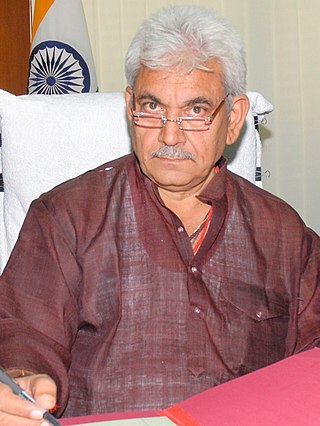
Manoj Sinha is an Indian politician serving as the 2nd and the current Lieutenant Governor of Jammu and Kashmir. He served as the Minister of State for Communications and Minister of State for Railways in the Government of India. Sinha was elected as Member of Parliament in the Lok Sabha, representing Ghazipur for three terms from the Bharatiya Janata Party. Sinha was in the race for the post of UP Chief Minister after 2017 Uttar Pradesh Legislative Assembly election.
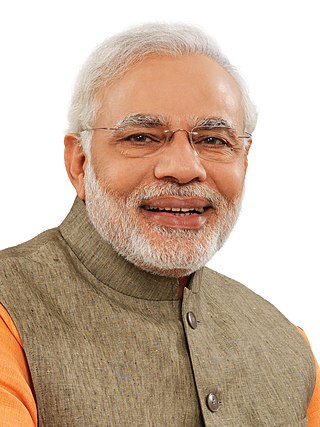
General elections were held in India in nine phases from 7 April to 12 May 2014 to elect the members of the 16th Lok Sabha. With 834 million registered voters, they were the largest-ever elections in the world until being surpassed by the 2019 election. Around 23.1 million or 2.71% of the total eligible voters were aged 18–19 years. A total of 8,251 candidates contested the 543 elected Lok Sabha seats. The average election turnout over all nine phases was around 66.40%, the highest ever in the history of Indian general elections until 2019 election.
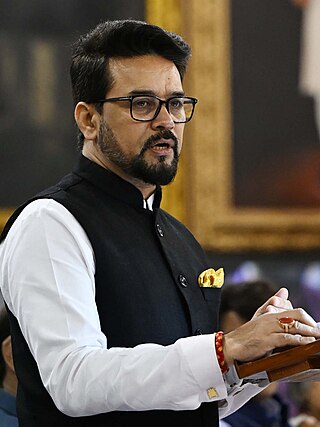
Anurag Singh Thakur is an Indian politician from the Bharatiya Janata Party and a Member of Parliament in the Lok Sabha from Hamirpur, Himachal Pradesh. He was former Minister of Sports, Youth Affairs and Minister of Information and Broadcasting in the Second Modi ministry. His father, Prem Kumar Dhumal was a former Chief Minister of Himachal Pradesh.

Krishan Pal Gurjar is an Indian politician and is the present Minister of State of Power and Heavy Industries. As a Member of Parliament in the Lok Sabha, he represents the Faridabad constituency in the state of Haryana. He won this seat in the 2014 Indian general election as a BJP candidate by a margin of 4,66,873 votes and he won election with margin of over 6 lakh in 2019 from Faridabad constituency. In August 2014 he also inaugurated Manjhawli bridge which is his dream project. In March 2024, he was re-fielded as the BJP candidate for the Faridabad constituency in the 2024 General Elections.
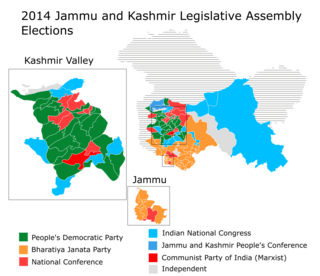
The 2014 Jammu and Kashmir Legislative Assembly election was held in the Indian state of Jammu and Kashmir in five phases from 25 November – 20 December 2014. Voters elected 87 members to the Jammu and Kashmir Legislative Assembly, which ends its six-year term on 19 January 2020. The results were declared on 23 December 2014. Voter-verified paper audit trail (VVPAT) along with EVMs were used in 3 assembly seats out of 87 in Jammu Kashmir elections.

Dr Nirmal Kumar Singh is an Indian politician and was the last Speaker of the Jammu and Kashmir Legislative Assembly of the erstwhile Jammu and Kashmir State. He is a former Deputy Chief Minister of Jammu and Kashmir. He is a leader of Bharatiya Janata Party. On 1 March 2015, he assumed the charge of the Minister for Power Development and Housing and Urban Development.

Sheikh Abdul Rashid, better known as Engineer Rashid, is a Kashmiri separatist politician, and currently member of Lok Sabha representing Baramulla constituency in Jammu and Kashmir, India. He is currently under bail after he was arrested on terror-funding charges.
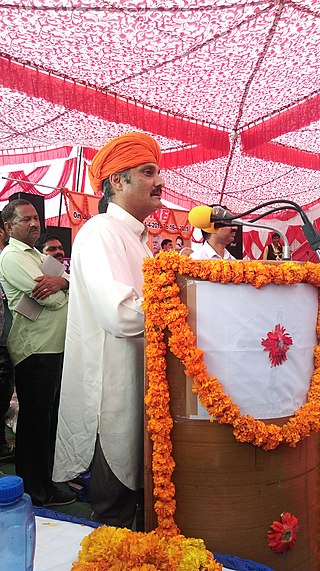
YuvrajVikramaditya Singh is an Indian businessman and politician. He was a leader of Indian National Congress (INC) and an ex-member of Jammu and Kashmir Legislative Council. He is the grandson of Maharaja Sir Hari Singh, who was the last ruler of the Indian princely state of Kashmir. He is the heir apparent of the Dogra dynasty.

Shakti Raj Parihar is an Indian politician and member of the Bharatiya Janata Party. Parihar is a former member of the Jammu and Kashmir Legislative Assembly from the Doda Vidhan Sabha in Doda district and a former Minister of State (MoS) in the BJP-PDP Government.
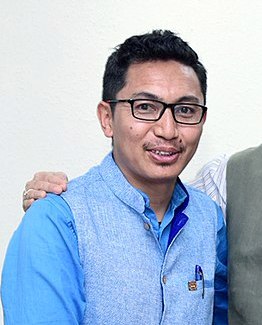
Jamyang Tsering Namgyal, also known by his initials JTN, is an Indian politician who served as a Member of Parliament in Lok Sabha for Ladakh, India's largest parliamentary seat geographically. Namgyal was elected, on 9 November 2018, to be the youngest and 8th Chief Executive Councillor (CEC) of Ladakh Autonomous Hill Development Council, Leh. He belongs to the Bharatiya Janata Party (BJP).
The Bharatiya Janata Party (BJP) is one of the two major political parties in India and has been the ruling party since the 16th Lok Sabha. It was seeking re-election in the 2019 parliamentary election as the leading party of the National Democratic Alliance, with Narendra Modi as its Prime Ministerial candidate and party president Amit Shah as the campaign chief.






















